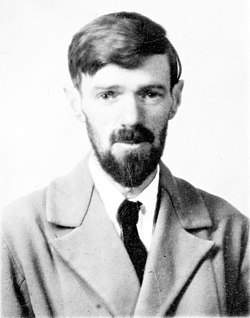D.H. Lawrence Quote
You have a place in my nature which no one else could fill. You have played a fundamental part in my development. And this grief, which has been like a clod between our two souls, does it not begin to dissipate? Ours is not an everyday affection. As yet, we are mortal, and to live side by side with one another would be dreadful, for somehow, with you I cannot long be trivial, and, you know, to be always beyond this mortal state would be to lose it. If people marry, they must live together as affectionate humans who may be commonplace with each other without feeling awkward- not as two souls. So I feel it.I might marry in the years to come. It would be a woman I could kiss and embrace, whom I could make the mother of my children, whom I could talk to playfully, trivially, earnestly, but never with this dreadful seriousness. See how fate has disposed things. You, you might marry, a man who would not pour himself out like fire before you. I wonder if you understand- I wonder if I understand myself.
You have a place in my nature which no one else could fill. You have played a fundamental part in my development. And this grief, which has been like a clod between our two souls, does it not begin to dissipate? Ours is not an everyday affection. As yet, we are mortal, and to live side by side with one another would be dreadful, for somehow, with you I cannot long be trivial, and, you know, to be always beyond this mortal state would be to lose it. If people marry, they must live together as affectionate humans who may be commonplace with each other without feeling awkward- not as two souls. So I feel it.I might marry in the years to come. It would be a woman I could kiss and embrace, whom I could make the mother of my children, whom I could talk to playfully, trivially, earnestly, but never with this dreadful seriousness. See how fate has disposed things. You, you might marry, a man who would not pour himself out like fire before you. I wonder if you understand- I wonder if I understand myself.
Related Quotes
About D.H. Lawrence
(1913), The Rainbow (1915), Women in Love (1920), and Lady Chatterley's Lover (1928) – were the subject of censorship trials for their radical portrayals of romance, sexuality and use of explicit language.
Lawrence's opinions and artistic preferences earned him a controversial reputation; he endured contemporary persecution and public misrepresentation of his creative work throughout his life, much of which he spent in a voluntary exile that he described as a "savage enough pilgrimage". At the time of his death, he had been variously scorned as tasteless, avant-garde, and a pornographer who had only garnered success for erotica; however, the English novelist and critic E. M. Forster, in an obituary notice, challenged this widely held view, describing him as "the greatest imaginative novelist of our generation". Later, the English literary critic F. R. Leavis also championed both his artistic integrity and his moral seriousness.
